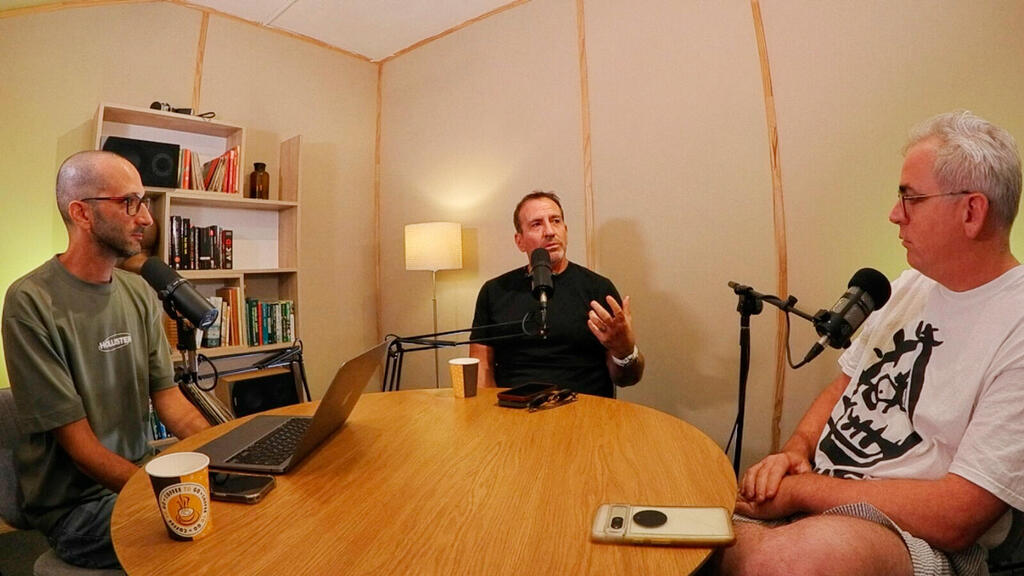
"Without Mellanox, Nvidia wouldn’t have become a $4 trillion powerhouse"
Eyal Waldman, founder of Mellanox and one of the most prominent entrepreneurs in the history of Israeli high-tech, talks about the historic merger with Nvidia, the future of AI and autonomous vehicles, the challenges of the labor market, and the role of education in Israel.
"I believe the synergy between the processor - the brain - and connectivity turned Nvidia from a $93 billion company into the $4 trillion giant it is today," says Israeli entrepreneur Eyal Waldman, on a special episode of Calcalist's podcast "Engines of Money". Waldman co-founded chip maker Mellanox Technologies, which was sold to Nvidia for $7 billion in 2020.
Waldman, an electrical engineer by training, founded the chip company Galileo a little over 30 years ago, which was later sold to Marvell. He then went on to found Mellanox, where he served for years as CEO, chairman, and president. In 2020, he led its sale to Nvidia - considered perhaps the most significant and important exit in Israel’s history.
"This is the most significant merger the industry has ever seen," he said. "Today, Nvidia Networking - which is essentially Mellanox - generates over $20 billion a year in sales, and it’s only continuing to grow at a rapid pace."
According to him, without Mellanox’s InfiniBand there would be no ChatGPT: “OpenAI always bought the most advanced generation from us. Without that connectivity, they wouldn’t have been able to reach the data processing speeds required for artificial intelligence.”
Waldman was speaking in "Engines of Money" the weekly economic podcast with Shay Selinas, Deputy Editor at Calcalist website, and Uri Greenfeld, Chief Economist and Strategist at Agam Leaderim.
Waldman describes the negotiations over Mellanox’s sale as a “big battle” between Intel, Nvidia, and other companies. “In the end, the connection with Jensen (Huang, Nvidia’s CEO) was natural. From the very beginning, we knew that was the direction. In 2019, Intel was worth far more than Nvidia, and just a year later, Nvidia surpassed it. Since then, it has only skyrocketed, thanks to the right bet on AI.”
And what would have happened if they hadn’t sold? “Mellanox would be worth hundreds of billions even as an independent company,” says Waldman, “but the merger was the right move. The shareholders gained, the employees who held Nvidia stock continue to benefit, and the country gained jobs and investments. It was a win-win deal for everyone.”
Waldman shares an experience from San Francisco: “I was standing at a traffic light, and four cars around me had no drivers. It works amazingly. Within just a few years, when 95% of the time you’re not in your own car, you’ll have access to an autonomous vehicle 24/7. cheap, reliable, and clean. It’s a revolution that will transform not only transportation but also education and entertainment. The car itself becomes a mobile data center.”
According to him, “Just as Americans in the 20th century once delivered ice and later moved on to other jobs, so too will today’s drivers and service workers find new occupations. There’s nothing to fear because technological shifts have always led to greater prosperity.”
At the same time, Waldman also points out a problem: “It’s clear that some jobs will disappear: drivers, cleaners, caregiving. We need to take care of these people with a universal basic income. If a hospital can save 90% of its budget thanks to robots, that money can be redirected to those workers. The models of income distribution must change.”
“I believe that in the AI era, we’ll have much more free time to do far more interesting things. Some jobs, like drivers, hospital cleaning, and various deliveries, will shift to robots. We need to make sure these people receive a universal basic income, because parts of their employment will disappear. But in the end, life will be much more efficient, much cheaper, and much better,” he said.
According to Waldman, the most dramatic change will be seen in medicine: “Artificial intelligence will detect cancer at an early stage, design personalized treatments, and even generate stem cells from your own body to regenerate organs and tissues. In the near future, we may be able to say 'there is no more death from cancer'.”
When asked about the importance of academia, even in the AI era, Waldman said: “The foundations are critical: physics, mathematics, computer science. Academia works at the forefront of research, but in Israel, we are moving backward. If the ultra-Orthodox and Arab communities don’t study core subjects and don’t enter the workforce, the country will not head in a good direction.”
Waldman insists that the situation in Israel is good: “The war takes a lot of energy, with people serving in the reserves, but we haven’t missed out. We have amazing people here and excellent companies. We need to invest more in artificial intelligence and integrate all communities - Haredim, Arabs, Druze, everyone. At Mellanox and Nvidia, we employed Arab and Palestinian workers, and we influenced Bedouin schools to increase the number of students studying advanced-level mathematics. That is the foundation for success.”
When asked about the next two years, he didn’t hesitate: “It depends on who will be prime minister. I hope the current one won’t be able to continue, because he is responsible for October 7. A wise leader can change the future by 180 degrees. It’s possible to reach peace agreements with Syria and Lebanon, solve the Palestinian issue at its root, and build a new reality where all the countries bordering Israel live in peace with it. That would be a historic breakthrough.”